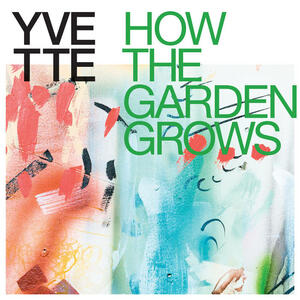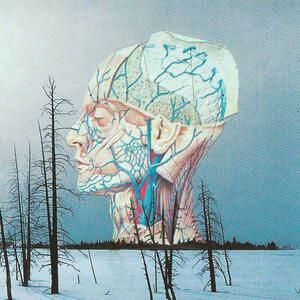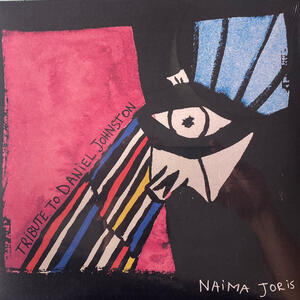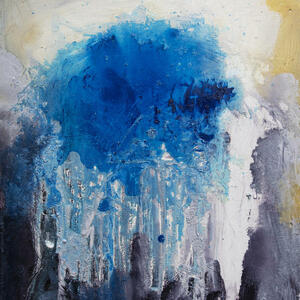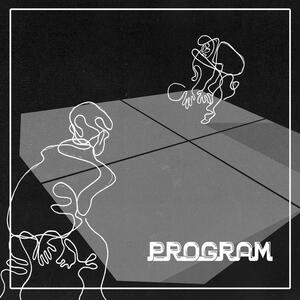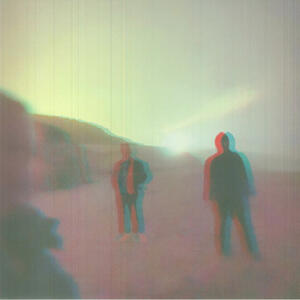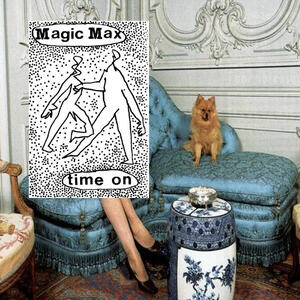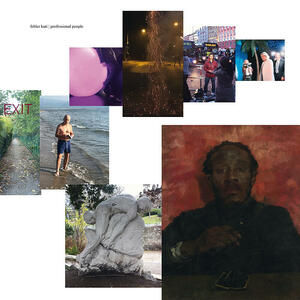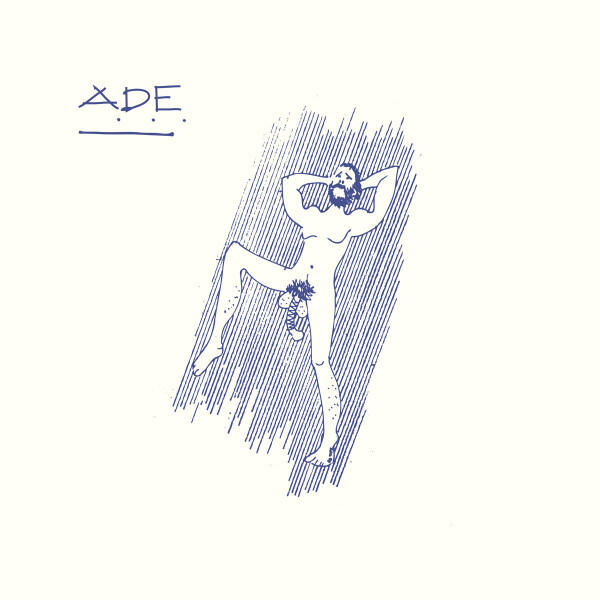
ADE & CONNAN MOCKASIN
IT'S JUST WIND
A few years in the not-so-distant past, a clairvoyant delivered an indelible message to Connan Mockasin. Inferring a project involving his father that had not yet been started, a woman he’d met only by chance told him: “You need to make it your priority, or you’ll regret it for the rest of your life”.
Though Connan and his father, Ade, had always joked that they’d make an album together, it was this extrasensory perception that summoned It’s Just Wind — its name a retort used by Ade’s father “whenever he broke wind and caused a ruckus around him” — into the realm of the real. Ade had himself only recently hovered precariously between realms; suffering a sudden cardiac arrest which left him flatlined for 40 minutes, and then in a coma. “I couldn’t win a raffle if there were two tickets in a plastic bucket” he muses, “so the chances of surviving a coronary ... surviving was good luck.”
Match struck against the box by future-seeing eyes, Connan proposed that the next of his yearly artist residencies at Mexican Summer’s Marfa Myths festival, in Marfa, Texas, be used to make the album that had been stirring in Ade for 40 years or more; for despite maintaining a lifelong interest in music, playing in various bands throughout the 1960s and 70s, recording sessions, and even making an album with his band The Autumn Stone, which survives only in the form of damaged master tapes — a fate he blithely aligns with the nearly-but-never-quite of The League of Gentleman’s Creme Brulee — an Ade Hosford album had never yet tasted the air.
With both label and medical sign-off, Ade left New Zealand on a desert-bound plane, armed with a children’s school exercise book of song ideas (“I wrote ‘POETRY’ on the front so the Americans didn’t see I was writing lyrics”). Aside from Ade’s notes, the album didn’t yet have a definite shape. Travel-weary, knee-deep in first-night margaritas, and on the precipice of going to bed, Connan and his band spontaneously upped instruments and began playing together in the studio they’d set up to start recording the next day. And, in a souplike stupor of which he has little memory (“I had a lot of nasty drugs pumped through me, my doctor at the time said it’d cooked the brain a bit”) Ade joined them, testing out bits of lyrics from his book, getting them wrong by accident, getting them wrong on purpose, cutting, sticking and ad-libbing through the fug, around Connan and Co.’s improvised arrangements, never quite sure of what the hell was going to come out next. When they listened back to what they’d captured on the 8-track cassette the next morning, they found that they had, somehow, committed the majority of an album to tape. “The whole recording was quite a fluke; it was the most natural recording I’ve ever been involved with,” reflects Connan. “It just seemed to be the right thing at the right time... There was a nice magic to it.” Ade concurs: “I got a bit emotional at one point, because the music was rolling right over the top of my head. I was standing facing the engineer and I had keyboards [John Carroll Kirby] one side, Connan [guitar, number two vocals], drummer [Matthew Eccles], bassist [Nicholas Harsant] the other side, and number two guitarist [Rory McCarthy, aka Infinite Bisous] right behind me, sitting on the couch, so I was completely enveloped. The sound roared over the top, and it got me.”
After just a couple more days of mixing and tweaking, still in-situ in Marfa, It’s Just Wind materialised: as much one continuous piece of music, operating on its own auto-written dream-logic, as a series of ten discrete songs. It starts with the big, bad tale of ‘The Wolf’ — a twisted, bongwater-and-panpipes spoken-word rehash of the familiar tale over a drum-machine beat, featuring three porky little shits and a rent-demanding lupine landlord. Sandwiched between instrumentals that are sometimes like mist rolling around a mountain-top (‘Edge of Darkness’), sometimes smooth, breezy and just slightly jolty, like the tape has worn thin in places (‘It’s Just Wind’) and sometimes 68-second master strokes of squelchy weirdo-funkery (‘What It Are’) are snippets of mussed-up vocal interjection from Connan (‘Tight Waxing’), and gruff rhythm-and-blues-inflected observations of the seemingly mundane (“Thirty-two leaf / sixty-four pages / seven millimeter ruled”, Ade sings on ‘Stuck’ — a lyric pulled not from inside his notebook, but from its very material reality).
Tucked under the ruckus of jam, distortion, and wry surrealism, there’s also a quietly contemplative narrative thread. ‘Te Awanga’ tells of a 6-week journey, undertaken long ago in a metal boat, from a far-off land to a distant land. ‘Marfa’ laments the inevitability of the 9-5, and ‘Round Peg in a Square Hole’ considers the quiet melancholia of not fitting in. “It’s primarily a story about a guy who was born in London, England, and came to New Zealand as a young child ... just a matter of survival basically, a story of some guy surviving in a new land,” Ade surmises. The lines between the jest and the serious, the fictive and the lived, blur, as the plotline of It’s Just Wind bends gently around Ade’s own. Indeed, the cover art — a drawing of a former boss, found by Connan with a stash of other artwork in the roof of Ade’s house — is also plucked from Ade’s past. A quality of bittersweet self-reflection, redolent of Bowie’s Blackstar or Cash’s American IV, pervades, as an old man, from a point of slight detachment, surveys his life like a landscape. Whiskey in hand, Ade looks across life and land both, from a porch, on final track ‘Clifton’. He laughs at it all. At slight remove from his debut album — to be released on the occasion of his 72nd birthday — he laughs at that too. “I’ve been listening to it every day for three years, and I still don’t understand it”.
Both a lifetime in the making and utterly impromptu, it means everything and nothing. It is, after all, just wind.
-Diva Harris, June 2021


